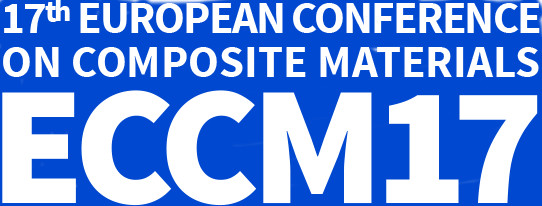

App-Einstellungen:
LOCAL DEFECT RESONANCE FOR EFFICIENT DEFECT DETECTION IN COMPOSITES
Markus Rahammer (Institut für Kunststofftechnik) Igor Soldov (Institut für Kunststofftechnik) Nikolai Glunizkij (Institut für Kunststofftechnik) Marc Kreutzbruck (University of Stuttgart)
Via the concept of local defect resonance it is possible to efficiently and selectively activate defects in composite materials, e.g. delaminations. Thermography and shearography are used for fast defect detection with vibration excitation.
MICRO-SCALE STRAIN MAPPING IN NANO-ENGINEERED FIBER-REINFORCED COMPOSITES
Mahoor Mehdikhani (KU Leuven) Anna Matveeva (KU Leuven) Mohammadali Aravand (KU Leuven) Brian Wardle (Massachusetts Institute of Technology) Stepan Lomov (KU Leuven) Larissa Gorbatikh (KU Leuven)
The application of digital image correlation at the micro-scale to nano-engineered fiber-reinforced composites is investigated. The resulting strain maps are compared with a finite element model, simulating CNTs grown radially on microfibers.
APPLICATION OF X-RAY COMPUTED MICRO-TOMOGRAPHY TO THE STUDY OF DAMAGE, SELF HEALING AND OXIDATION OF THERMOSTRUCTURAL COMPOSITES
Olivier Caty (University of Bordeaux) Vincent Mazars (University of Bordeaux) Bertrand Remi (University of Bordeaux) Denneulin Sebastien (Herakles (SAFRAN)) Guillaume Couegnat (University of Bordeaux) Gerard Vignoles (University of Bordeaux)
Failure and oxidation of self healing phases in CMC are studied in-situ using μCT. Crack networks were analysed during tension at high temperature (20°C to 1250°C). Image based FE models were built to better understand tests.
DEFORMATION ANALYSIS OF POLYMER FOAMS UNDER COMPRESSION LOAD USING IN SITU COMPUTED TOMOGRAPHY AND FINITE ELEMENT SIMULATION METHODS
Oliver Weißenborn (Technical University of Dresden) S. Geller (Technical University of Dresden) Mike Gude (Technical University of Dresden) Folke Post (Technical University of Dresden) S. Praetorius (Technical University of Dresden) Axel Voigt (Technical University of Dresden) S. Aland (Technical University of Dresden)
A novel in situ CT device is used to perform compression tests on closed-cell polymeric foams to analyse the deformation behaviour. With the introduction of a phase field function, complex structures can be meshed for simulation.
EX-SITU TIME-LAPSE X-RAY CT STUDY OF 3D MICRO-STRUCTURAL FATIGUE DAMAGE EVOLUTION IN UNI-DIRECTIONAL COMPOSITES
Kristine Munk Jespersen (Technical University of Denmark) Ying Wang (University of Manchester) Jens Zangenberg (Composite Mechanics, LM Wind Power Blades) Tristan Lowe (University of Manchester) Philip J. Withers (University of Manchester) Lars P. Mikkelsen (Technical University of Denmark)
In this study, fatigue damage progression in terms of individual fibre fractures and off-axis cracks in a NCF fibre composite is observed in-destructively by transilluminated white light imaging and ex-situ X-ray computed tomography.
IN-SITU X-RAY COMPUTED TOMOGRAPHY ANALYSIS OF ADHESIVELY BONDED RIVETED LAP JOINTS
René Füßel (Technical University of Dresden) Maik Gude (Technical University of Dresden) Achim Mertel (Leichtbau-Zentrum Sachsen)
The paper describes a new approach for analysing damage and failure phenomena in combined hybrid joints. A combination of destructive and non-destructive test methods makes it feasible to detect crack initiation and propagation in single-lap joints.
MECHANISMS OF AIR REMOVAL AND VOID DEVELOPMENT IN OUT-OF-AUTOCLAVE PROCESSING OF HAND LAY-UP LAMINATES
Juan José Torres (IMDEA Materials) Federico Sket (IMDEA Materials Institute) Carlos González (Polytechnic University of Madrid & IMDEA Materials Institute) M. Simmons (Hexcel Composites)
The aim of this study is to understand the void formation, transport mechanisms and porosity evolution during OoA consolidation process in laminates produced by hand lay-up (HLU) and cured in an industrial oven, using vacuum bag only (VBO) technique.
QUANTITATIVE EVALUATION OF INDUCED POROSITY REFERENCE SAMPLES IMPLEMENTED BY DRILL HOLE IN CFRP USING XCT AND VARIOUS SEGMENTATION PARAMETERS
Guruprasad Rao (FH OÖ Forschungs & Entwicklungs GmbH) Bernhard Plank (University of Applied Sciences Upper Austria) Christoph Heinzl (University of Applied Sciences Upper Austria) Johann Kastner (University of Applied Sciences Upper Austria)
This paper is regarding volume porosity evaluation in CFRP using XCT by implanting known amount of voids. Drilling of holes of 200 and 300 µm is performed. Scans at various voxel sizes are analysed. Repeatability is checked and verified.
THREE-DIMENSIONAL CHARACTERIZATION OF STRUCTURE AND DAMAGE OF POLYMERS USING A TALBOT-LAU GRATING INTERFEROMETER µ-XCT
Johann Kastner (University of Applied Sciences Upper Austria) Sascha Senck (University of Applied Sciences Upper Austria) Bernhard Plank (University of Applied Sciences Upper Austria) Dietmar Salaberger (University of Applied Sciences Upper Austria) Guruprasad Rao (FH OÖ Forschungs & Entwicklungs GmbH) Christian Gusenbauer (University of Applied Sciences Upper Austria)
We present results of a novel Talbot-Lau grating interferometry desktop µ-XCT-system which are compared to conventional high resolution XCT-results. Three different kind of damages in composites are characterized: impact, tensile and cyclic loading.
ULTRA-FAST TIME-LAPSE SYNCHROTRON RADIATION IMAGING OF COMPRESSIVE FAILURE IN UD CFRP
Ying Wang (University of Manchester) Serafina Consuelo Garcea (University of Manchester) Tristan Lowe (University of Manchester) Eric Maire (INSA de Lyon) Costas Soutis (University of Manchester) Philip J. Withers (University of Manchester)
In this paper, the compressive failure of unidirectional carbon fibre/epoxy composite rods is studied using ultra-fast time-lapse synchrotron X-ray imaging, involving both two-dimensional radiography and three-dimensional computed tomography.
